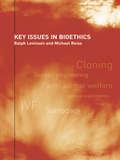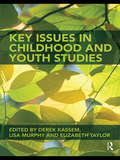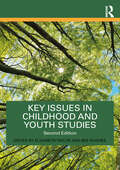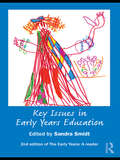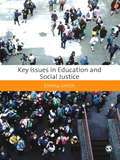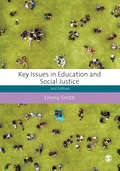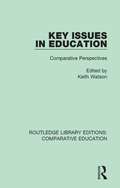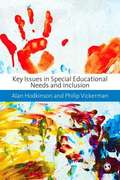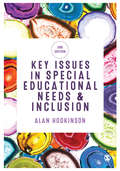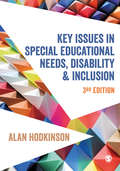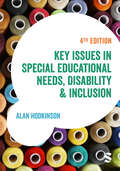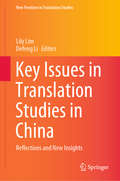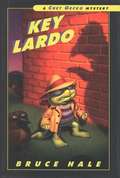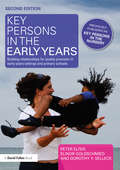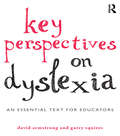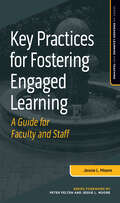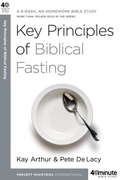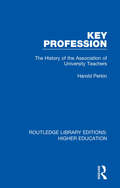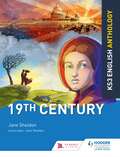- Table View
- List View
Key Issues in Bioethics: A Guide for Teachers
by Ralph Levinson Michael J. ReissYoung people are increasingly being exposed to the huge and complex ethical dilemmas involved in issues such as genetic modification, animal rights and cloning, and they are bringing their views into the classroom. But how can teachers be sure they are sufficiently well-informed to help their pupils make sense of the diverse and emotive arguments surrounding these issues? This book holds the answer. Written by leading ethicists, scientists and technologists, it offers a balanced and jargon-free guide to such highly debated topics as: * cloning* in vitro fertilisation* genetic screening and genetic engineering* farm animal welfare* the use of animals in medical experiments. Written specifically for the non-specialist teacher or lecturer, this book offers suggestions on how to approach the teaching of bioethics and provides useful sources of further information. It may also be of interest to undergraduates on science courses.
Key Issues in Childhood and Youth Studies
by Elizabeth Taylor Lisa Murphy Derek KassemKey Issues in Childhood and Youth Studies presents an informed and critical commentary on a range of key issues related to children and childhood, from birth to eighteen years. Challenging current orthodoxies within the adult world on the nature of childhood, it is an essential text for students of childhood and youth studies as well as those studying relevant professional qualifications in social work, teaching and health. Exploring ideas from the historical development of childhood to the demonising of youth, it is divided into five clearly defined sections, each with their own editorial introduction which highlights the key themes. The sections focus on: the concept and creation of childhood child development ideas of risk, protection and childhood the politics of childhood international perspectives on childhood. This invaluable textbook provides an overview of childhood and youth studies and encourages students to think about the issues discussed and to develop their own ideas. Each chapter contains student activities, key concept boxes, recommended further reading and a reflection exercise.
Key Issues in Childhood and Youth Studies
by Elizabeth TaylorThis fully revised and expanded second edition of Key Issues in Childhood and Youth Studies presents an informed and critical commentary on a range of key issues related to children and childhood, from birth to eighteen years.Challenging current orthodoxies within the adult world on the nature of childhood, it is an essential text for students of childhood and youth studies as well as those studying relevant professional qualifications in social work, teaching and health. Exploring ideas from the historical development of childhood to the demonising of youth, it is divided into five clearly defined sections, each with their own editorial introduction which highlights the key themes: Creating Childhood, The Developing Child, Children at Risk, The Politics of Childhood, Bordered Childhood and International Perspectives.Containing 15 newly written chapters and three revised pieces, this invaluable textbook provides an overview of childhood and youth studies and encourages students to think about the issues discussed and to develop their own ideas. Each chapter contains student activities, key concept boxes, recommended further reading and a reflection exercise.
Key Issues in Early Years Education: A Guide for Students and Practitioners
by Sandra SmidtKey Issues in Early Years Education is the second edition of The Early Years: A Reader. This essential text for students and professionals is unique in its range of voices and topics and in its determination to see the child as central to learning and development. As in the first edition it not only has chapters written by key figures in the field of early childhood education and care but also by students on a range of early childhood programmes. Notable key figures from the first edition have been added including Helen Penn, Henrietta Dombey, Hilary Faust and Charmian Kenner. Rosemary Nalden, who is involved in significant work with children in South Africa, has added her voice to give us examples of children acting both as learners and teachers. This fully revised collection is a comprehensive investigation into the key issues in early years education which: provides a blend of real life examples and theory, drawn from a diversity of early childhood settings and classes is written in an accessible voice brings theory to life by linking it with practice examines how children explore, express and represent their worlds. Many of the original sections have been revised and updated to take account of changes to the education system over the last decade. Two new sections in this edition are Children as Thinkers and Problem-Solvers and Learning: A Second Chance, which looks at adults learning something new and considers the similarities and differences that might exist between them and children. This fascinating and highly readable book will be of interest to teachers, practitioners, students and anyone concerned with the care and education of our youngest children.
Key Issues in Education Policy (Education Studies: Key Issues)
by Stephen Ward Christine E. Eden'Ward and Eden have produced a useful and elegant text which deserves a place on the reading list of any education degree. I certainly hope that its readership goes beyond the most obvious target audience, as anyone involved in education would do well to read and enjoy this text' - ESCalate 'Education Policy is increasingly complex and opaque - this timely book brings clarity and reason to bear and is an ideal starting point for students and teachers struggling to understand the political world in which they work' - Professor Stephen J Ball, Institute of Education, University of London What effect has two decades of intensive state direction and government involvement had on education? Designed for Education Studies students who have probably grown up in this context of government intervention, this book deconstructs accepted notions and provides readers with the resources to discuss critically the role of the governments in education and schooling. The book examines government policy in a series of key areas, such as the curriculum, market forces, educational inequality and race issues. Throughout it considers the political and economic factors in education policy, introducing some of the fundamental concepts required to analyse the ideologies of education and the state. The authors explore the role of education policy in the context of the general direction of government policy, politics and the economy, making links with other policy areas such as health, social services, home affairs and foreign policy. They also explain the nature of government policy in terms of a globalization and the knowledge economy.
Key Issues in Education and Social Justice (Education Studies: Key Issues)
by Emma Smith'This excellent book considers the extent to which policy and practice, particularly in the UK, have led to a more equitable education system and ultimately to a fairer society. The ideas and arguments are extremely accessible, wide-ranging and well-informed. A welcome addition to the reading list and one that I can highly recommend' - Jane Bates, Programme Leader fo Education Studies, Manchester Metropolitan Univeristy Inequalities can be experienced in different forms, from birth to school experiences to the many different modes of learning as we grow up. This book focuses on educational experience as a lifelong and society-wide issue. The author draws on research, policy and contemporary thinking in the field to provide a comprehensive guide to the educational inequalities that may exist and persist throughout an individual's educational course. Providing an international perspective on different ethnic, gender and social groups, the book covers a broad range of issues, including: - theoretical, policy and research developments in the area - inequalities that may exist during the years of schooling - government policy - beyond the school classroom This book is essential reading for undergraduate students on Education-Studies programmes. It is also useful for students on Masters and Initial Teacher Education programmes. Emma Smith is Reader in Education at the University of Birmingham
Key Issues in Education and Social Justice (Education Studies: Key Issues)
by Emma Smith‘This highly accessible book weaves together discussion of recent research findings, policy developments and theoretical perspectives. It provides a thought-provoking and at times contentious introduction that will challenge students and teachers to look beyond the easy and glib rhetoric, helping them understand the complexities of educating for a more equal world.' Shereen Benjamin, Senior Lecturer in Primary Education, University of Edinburgh This book is an introduction to issues of inequality and social justice, how they relate to education systems and how education can be a force for positive societal change. Drawing upon research, policy and contemporary thinking in the field, this second edition examines educational inequalities that exist today, what lies behind them and what effects they have across society. New to this edition: Wider coverage on social inequalities in relation to income and wealth New chapters on: childhood inequalities, international issues in education and social justice, and education inequalities in the USA A broader focus on how young people experience social justice that includes the experiences of young offenders. This is essential reading for students on undergraduate education studies courses, and related degree programmes that explore the relationship between education and society.
Key Issues in Education and Social Justice (Education Studies: Key Issues)
by Emma Smith‘This highly accessible book weaves together discussion of recent research findings, policy developments and theoretical perspectives. It provides a thought-provoking and at times contentious introduction that will challenge students and teachers to look beyond the easy and glib rhetoric, helping them understand the complexities of educating for a more equal world.' Shereen Benjamin, Senior Lecturer in Primary Education, University of Edinburgh This book is an introduction to issues of inequality and social justice, how they relate to education systems and how education can be a force for positive societal change. Drawing upon research, policy and contemporary thinking in the field, this second edition examines educational inequalities that exist today, what lies behind them and what effects they have across society. New to this edition: Wider coverage on social inequalities in relation to income and wealth New chapters on: childhood inequalities, international issues in education and social justice, and education inequalities in the USA A broader focus on how young people experience social justice that includes the experiences of young offenders. This is essential reading for students on undergraduate education studies courses, and related degree programmes that explore the relationship between education and society.
Key Issues in Education: Comparative Perspectives (Routledge Library Editions: Comparative Education #18)
by Keith WatsonOriginally published in 1985. Throughout the world the same key issues of concern recur in education in different countries. However, education specialists all too often are inward looking and consider problems only in the confines of their own country. This book argues that much is to be gained by taking a broader, more international view as the experiences of other countries can often provide valuable insights on how policies and practice can be improved in one's own country. The book illustrates this argument by examining in detail seven major issues of present concern and comparing how they are handled in different countries.
Key Issues in Special Educational Needs and Inclusion
by Alan Hodkinson Philip Vickerman'This is probably one of the most accessible books I have read lately in relation to SEN and Inclusion, and I intend to make it an essential core text for my inclusion module. It would be very accessible to students who are relatively new to the theoretical aspects behind the idea or concept of inclusion' - ESCalate Complex and diverse, special educational needs and inclusion can be a difficult area of study to approach for undergraduate students. Understanding the current context of SEN and inclusion means getting to grips with an often perplexing mix of social, political, ideological, educational and personal perspectives. This book explores and critically examines the field, providing a detailed introduction to the topic for students - helping them to develop understanding, without assuming any prior knowledge. Section one defines the concepts of SEN and disability and how the concepts have been defined through ideological models that have developed over time. It examines provision for SEN across the UK, and looks at how attitudes of teachers, parents and children have affected inclusion. Section two explores the historical development of SEN internationally, including a comparative look at legislation and practice in England and a number of other countries. Section three details how SEN practice in England works, including the Every Child Matters agenda and the roles and responsibilities of education, health and social care professionals. Each chapter includes short case studies, points for reflection, student activities and suggestions for further reading. Alan Hodkinson is principal lecturer in education research at Liverpool John Moores University, where Philip Vickerman is Professor of Inclusive Education and Learning, and Head of Research for Physical Education, Sport, Dance and Outdoor Education.
Key Issues in Special Educational Needs and Inclusion (Education Studies: Key Issues)
by Alan HodkinsonUnderstanding and engaging critically with the field of special educational needs and disability (SEND) is a difficult task. However, the new edition of this bestselling book continues to help students contextualize SEND in relation to historical, ideological and political developments as well as support them in developing a critical understanding of the complexities associated with inclusion. Completely up to date with recent legislation such as the SEND Code of Practice (2014) there are case studies, reflections and activities which will help students question practice they have seen and experienced. Covering the 0-25 age range this book is suitable for all those working with children and young people across education, health and social work.
Key Issues in Special Educational Needs and Inclusion (Education Studies: Key Issues)
by Alan HodkinsonUnderstanding and engaging critically with the field of special educational needs and disability (SEND) is a difficult task. However, the new edition of this bestselling book continues to help students contextualize SEND in relation to historical, ideological and political developments as well as support them in developing a critical understanding of the complexities associated with inclusion. Completely up to date with recent legislation such as the SEND Code of Practice (2014) there are case studies, reflections and activities which will help students question practice they have seen and experienced. Covering the 0-25 age range this book is suitable for all those working with children and young people across education, health and social work.
Key Issues in Special Educational Needs, Disability and Inclusion (Education Studies: Key Issues)
by Alan HodkinsonThis third edition continues to guide students through the challenging field of special educational needs and disability. Contextualising SEND in relation to historical, ideological and political developments, this book offers essential support to students as they develop a critical and up-to-date understanding of the practical challenges and opportunities concerning inclusion. New edition features include: • Up-to-date legislation, such as the SEND Code of Practice • Material surrounding social, emotional and mental Heath • New practical case studies, reflections and activities • Revised chapter summaries • More on the future of SEND
Key Issues in Special Educational Needs, Disability and Inclusion (Education Studies: Key Issues)
by Alan HodkinsonThis third edition continues to guide students through the challenging field of special educational needs and disability. Contextualising SEND in relation to historical, ideological and political developments, this book offers essential support to students as they develop a critical and up-to-date understanding of the practical challenges and opportunities concerning inclusion. New edition features include: • Up-to-date legislation, such as the SEND Code of Practice • Material surrounding social, emotional and mental Heath • New practical case studies, reflections and activities • Revised chapter summaries • More on the future of SEND
Key Issues in Special Educational Needs, Disability and Inclusion (Education Studies: Key Issues)
by Alan HodkinsonThis fourth edition has been revised throughout to continue to support students in their learning of special educational needs and disability. This essential book provides students with a critical and up-to-date view of the sector through key issues and debates to deepen understanding around inclusion. New to this edition: - Revised further reading with videos and podcasts to support learning and research - Links to the new Green Paper, latest Code of Practice and legislation - Extensive updates and revisions to all chapters - New case studies, reader reflections, taking it further and student activities. Alan Hodkinson, Professor in the Centre for Cultural and Disability Studies at Liverpool Hope University.
Key Issues in Special Educational Needs, Disability and Inclusion (Education Studies: Key Issues)
by Alan HodkinsonThis fourth edition has been revised throughout to continue to support students in their learning of special educational needs and disability. This essential book provides students with a critical and up-to-date view of the sector through key issues and debates to deepen understanding around inclusion. New to this edition: - Revised further reading with videos and podcasts to support learning and research - Links to the new Green Paper, latest Code of Practice and legislation - Extensive updates and revisions to all chapters - New case studies, reader reflections, taking it further and student activities. Alan Hodkinson, Professor in the Centre for Cultural and Disability Studies at Liverpool Hope University.
Key Issues in Translation Studies in China: Reflections and New Insights (New Frontiers in Translation Studies)
by Defeng Li Lily LimThis book revisits a number of key issues in Chinese Translation Studies. Reflecting on e.g. what Translation Studies researchers have achieved in the past, and the extent to which the central issues have been addressed and what still needs to be done, a group of respected scholars share their expertise in order to identify some tangible directions and potential areas for future research. In addition, the book discusses a number of key themes, e.g. Translation Studies as a discipline and its essential characteristics, the cultural dimension in translator training, paradigms of curriculum design, the reform of assessment for professional qualification, acts and translation shifts, the principle of faithfulness in translation, and interpreter’s cognitive processing routes. The book offers a useful reference guide for a broad readership including graduate students, and shares insiders’ accounts of various current topics and issues in Chinese Translation Studies. Given its scope, it is also a valuable resource for researchers interested in translation studies in the Chinese context.
Key Lardo
by Bruce HaleHold on to your fedoras, Gecko fans: Chet and Natalie have at last met their sleuthing match. That's right--a new detective has arrived at Emerson Hicky Elementary. His name's Bland. James Bland. Bland immediately cracks a case that has baffled Chet and Natalie. Do our favorite PIs get jealous? You'd better believe it! And if this wasn't bad enough, when Bland suddenly goes missing, the blame falls squarely on Chet. The only way for our hero to clear his name is to rescue his tubby rival. It's either that or face a stint behind bars--and we're not talking the jungle gym. This twelfth installment in Bruce Hale's Chet Gecko series is full of the hilarious characters, witty one-liners, and fast-paced mystery that have made Chet a favorite with middle grade readers.
Key National Education Indicators: Workshop Summary
by Alexandra BeattyThe education system in the United States is continually challenged to adapt and improve, in part because its mission has become far more ambitious than it once was. At the turn of the 20th century, less than one-tenth of students enrolled were expected to graduate from high school. Today, most people expect schools to prepare all students to succeed in postsecondary education and to prosper in a complex, fast-changing global economy. Goals have broadened to include not only rigorous benchmarks in core academic subjects, but also technological literacy and the subtler capacities known as 21st-century skills. To identify the most important measures for education and other issues and provide quality data on them to the American people, Congress authorized the creation of a Key National Indicators System (KNIS). This system will be a single Web-based information source designed to help policy makers and the public better assess the position and progress of the nation across a wide range of areas. Identifying the right set of indicators for each area is not a small challenge. To serve their purpose of providing objective information that can encourage improvement and innovation, the indicators need to be valid and reliable but they also need to capture the report committee's aspirations for education. This report describes a workshop, planned under the aegis of the Board on Testing and Assessment and the Committee on National Statistics of the National Research Council. Key National Education Indicators is a summary of the meeting of a group with extensive experience in research, public policy, and practice. The goal of the workshop was not to make a final selection of indicators, but to take an important first step by clearly identifying the parameters of the challenge.
Key Persons in the Early Years: Building relationships for quality provision in early years settings and primary schools
by Peter Elfer Elinor Goldschmied Dorothy Y. SelleckKey Persons in the Early Years aims to explain what a Key Person is, the theory behind the approach and the practicalities of implementation. Practical in its approach and containing case studies as examples of reflective practice, this second edition details the role of the Key Person across all ages in the early years. This new edition has been fully updated in line with the EYFS and features a new chapter on the Key Person approach with 3-5 year olds. The book offers guidance on: making the Key Person approach work in your setting with realistic strategies; the benefits of this approach for children's well being, for their learning and to ensure equal chances for all children; potential challenges and problems and how to overcome them drawing on accounts from practitioners of their journey in implementing this approach. This book will be an essential text for practitioners and students who wish to fully understand the Key Person role and how it can benefit children, parents and their setting.
Key Perspectives on Dyslexia: An essential text for educators
by David Armstrong Garry SquiresThis indispensable book critically sets out the skills and knowledge required by a specialist educator for students who present with dyslexia. The British Dyslexia Association Professional Criteria (BDA, 2012) provides an anchor throughout for this book’s content. Chapters are explicitly mapped to specific professional criteria, offering the reader confidence that guidance in Key Perspectives on Dyslexia is underpinned by this internationally recognised professional framework.?? Key issues in the education and care of those affected by dyslexia are critically explained and explored in this publication, using both author’s years of specialist experience in this field. As established scholars both authors also suggest how research can inform and enrich how an educator responds to these issues.?? The content of this book includes: Detailed case studies disclosing how dyslexia presents in different individuals and which richly illuminate the issues considered by each chapter A concise examination of reading instruction in the context of typically-developing students and in relation to those who present with dyslexia: this incorporates an expert but accessible review of international policy and educational practice, including influential findings from research Detailed guidance on how to identify possible dyslexia and key issues to consider in referral and assessment of those affected, including associated models here such as Response to Intervention (RTI)? Consideration of intelligence and in how this figures in relation to assessment for dyslexia, including the possible role of intellectual disability (ID). Comprehensive evaluation of the role of behaviour in relation to dyslexia, with guidance on how this can be used to inform a programme of support for students with social, emotional or behavioural difficulties (EBD/SEBD). Consideration of how the professional role of a specialist educator might travel across the English speaking world and also beyond in China or India.?? Key Perspectives on Dyslexia is an essential text for educators and will become a landmark guide for educational practice and policy.???
Key Practices for Fostering Engaged Learning: A Guide for Faculty and Staff (Series on Engaged Learning and Teaching)
by Jessie L. MooreThis book emerges from the author’s ongoing work as director of Elon University’s Center for Engaged Learning, where for the past decade, more than 200 scholars from over 120 post-secondary institutions across more than a dozen countries have participated in multi-institutional scholarship of teaching and learning (SoTL). This book focuses on six key practices:· Acknowledging and building on students’ prior knowledge and experiences · Facilitating relationships · Offering feedback · Framing connections to broader contexts · Fostering reflection and metacognition · Promoting integration and transfer of knowledge and skills.Following the introduction, the author devotes individual chapters to each of the six practices, and the concluding chapter focuses on implementing the six practices as an integrated approach.
Key Principles of Biblical Fasting: A 6-Week, No-Homework Bible Study (40-Minute Bible Studies)
by Kay Arthur Pete De LacyDiscover the Purpose and Power of Fasting Do you desire to feel His presence, hear His voice, sense His pleasure? Since ancient times, fasting has been considered an essential means of drawing near to God. But this spiritual discipline involves much more than abstaining from food; it goes right to the heart of genuine faith. Through this invigorating study, you’ll gain a clear understanding of the principles behind this practice and be equipped to make fasting a key part of your relationship with God.
Key Profession: The History of the Association of University Teachers (Routledge Library Editions: Higher Education #21)
by Harold PerkinOriginally published in 1969 Key Profession looks at the rise of the academic profession to its influence and importance, through the history of the Association of the University of Teachers, founded in 1919 and celebrating its half-centenary in 1969. As a study of a professional organization and political pressure group concerned with salary negotiations, conditions of service, academic freedom, and public policy on higher education, it is of interest not only to social historians but also to economists, political scientists, sociologists, and all those who have at heart the search for intellectual truth, the maintenance of cultural values and the integrity of the universities. The book tries to show what part the academic profession has played in the shaping of higher education, and through it of modern society, in twentieth-century Britain.
Key Stage 3 English Anthology: 19th Century
by Jane SheldonInspire your teaching with Key Stage 3 English Anthology: 19th Century, a themed anthology for Year 9. Featuring Austen, Brontë and Tennyson, this Anthology guides students through fiction, non-fiction and poetry, encouraging them to connect with a variety of texts to gain a thorough understanding of the context and literary techniques underpinning each piece.Each extract is supported by Teaching and Learning Resources, including quizzes, lesson plans and PowerPoint slides to help you implement the content of the book.Each extract includes:- A context panel to provide key information to set the scene- Glossaries and annotations to help students work through each extract confidently- Look closer: key questions for students to consider as they work through the extracts- Now try this: writing and speaking activities to encourage students to get creative and actively engage with the text- Fast finisher tasks to support students who race ahead- A practice question to familiarise students with the command words they will see at GCSE
